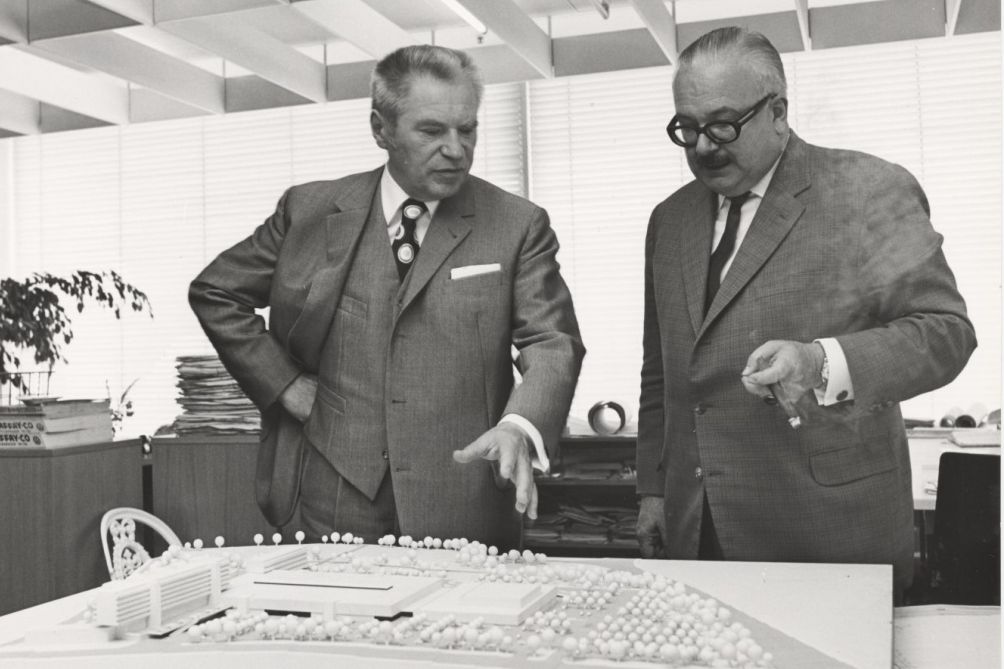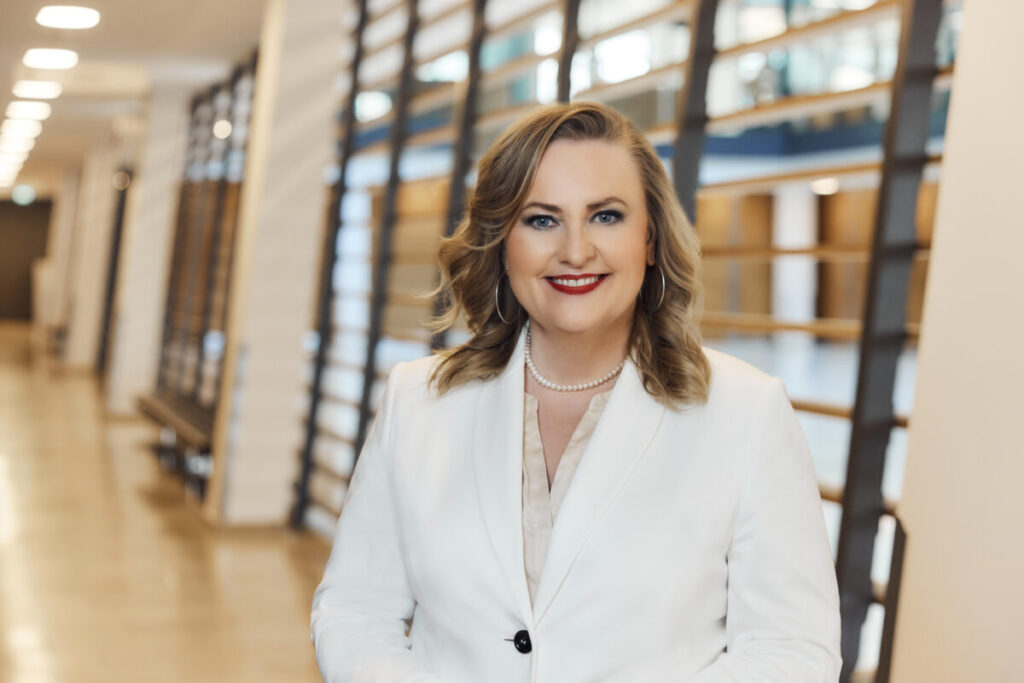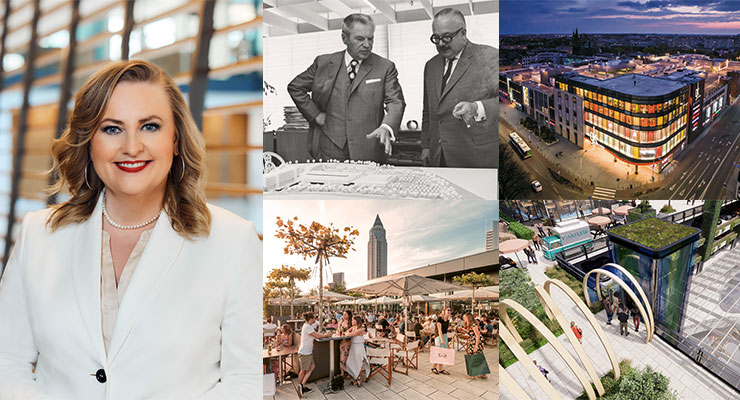This interview was conducted by Reinhard Winiwarter
ACROSS: ECE is celebrating its 60th anniversary this year. How significant is this anniversary to you – both personally and professionally?
JOANNA FISHER: On a personal level, this anniversary is a very emotional occasion for me. I’ve been part of ECE for 27 years, so I’ve experienced and helped shape nearly half of the company’s history. It’s fascinating to see how the company has changed over the last few decades. We’ve been through a number of phases: new developments, expansion, internationalization, digitization, diversification, specialization. One thing, however, has remained consistent through it all: change. Constant change has always been the key to our success. ECE has always been receptive to change and committed to continuous improvement.
However, a company is only as good and successful as the people who work with it. This anniversary provides us with the perfect opportunity to express our gratitude to all of our employees – as well as to the Otto family, who founded the company. Without their entrepreneurial vision, we wouldn’t be where we are today.

ACROSS: Therefore, change is a central theme. Are there any milestones that have had a particular impact on ECE?
FISHER: The foundation for all subsequent milestones was, of course, laid when the company was founded: Werner Otto adopted the US shopping center model – a visionary move for Europe in the 1960s. In the 1970s, we expanded our activities to other asset classes and also brought thirdparty investors on board in the center business for the first time, which had a lasting impact on our financing structure. Our expansion into the new federal states and Eastern Europe after the fall of the Berlin Wall marked another major milestone.
In the 2000s, we broke new ground with the establishment of the first investment fund platform for shopping centers. Deutsche Euro-Shop was also founded as the first shopping center company around that time, and we continue to manage all of its centers to this day. Today, we pursue a hybrid business model, managing both all the centers in which the Otto family has a stake, as well as third-party owned properties. Most recently and in particular, the pandemic forced us to further accelerate our transformation. Our current structure, among other things, has emerged as a result: there is clear specialization within the Group in terms of asset classes, and ECE Marketplaces has been established as an independent company. These developments show that change has never been a source of fear for us. Change is in our DNA.
ACROSS: What does leadership in such a complex, changing environment mean to you?
FISHER: For me, the most important thing about leadership is the ability to provide clarity and remain predictable – even, and especially, during volatile times. The people who work for a given company desire trust, guidance, and values. My role, as I see it, is to be a constant, visible source of strength. Of course, I can’t eliminate every uncertainty, but I can show conviction, explain decisions, and work out solutions together with the team. That creates trust.
At ECE, our staff turnover rate is low compared to the industry average, and many of our employees have been with us for a number of years – that reflects our family-like, trust-based corporate culture, even given the size of our company.
ECE – SIXTY YEARS OF CHANGE
ACROSS: How much has your own career path helped you in that regard? You started at ECE as a student and have since become the CEO of ECE Marketplaces. Not only is that an impressive career path and quite possibly unique in this industry, but it also demonstrates your loyalty and the appeal of ECE as an employer.
FISHER: I did, indeed, start as a working student, and now I’m the CEO. While that may be unique in this industry, it’s not unique at ECE. My colleague Claudia Plath, CFO of the ECE Group, has a similar career path, for example. When we talk about the future, careers, and, above all, sustainable corporate success, we are essentially talking about values. ECE’s values are strongly influenced by the tradition of the Hanseatic merchant – reliability, clarity, a strong sense of responsibility, and a high degree of integrity.
Even though our market presence has changed over the years, our foundation has always remained the same. For us, tradition is not about standing still – it’s about being steadfast in how we treat each other and how we make decisions. That clear stance, the opportunity for personal development, and always having attractive prospects within the company have been and continue to be key factors in my career at ECE. Of course, that has also had a positive impact on our employees. We encourage people to reach their potential – and that shapes our culture.
ACROSS: How have times of transformation, crises, and generational change altered your leadership style?
FISHER: Leadership today requires a greater degree of empathy. Transparent communication is essential, particularly during periods in which we must navigate turbulent waters together – and external influences render future-oriented, long-term decisions challenging. At the same time, it takes courage to make difficult decisions, such as those required during restructuring phases. Today, however, I can clearly see that the resilience of our employees has grown despite the increasing challenges. Many have proven to be extremely adaptable and willing to learn in recent years. That makes me optimistic, and in terms of the working world, it is also the result of our open, valuebased corporate culture.
ACROSS: How do you tackle the challenge of combining tradition, values, and innovation?
FISHER: Innovation does not work without values. We were quick to recognize the strategic importance of issues such as digitalization, sustainability, and new tenant markets. We published our first sustainability report back in 2008 – at a time when hardly anyone else in the market was doing so. We continuously invest in expertise and structures, which enables us to play an active role in shaping new developments – always with our core business in mind: the design and development of retail real estate. Innovation is not an end in itself, but a means of securing the future. We identify trends early on, invest in expertise, create new teams, and experiment with ideas. However, we have never done things just because they were modern or trendy. We do what makes sense – and we do it in a fully consistent manner. If we realize that something isn’t working, we stop doing it.

ACROSS: Let’s move on to one of ECE Marketplaces’ core business areas: Leasing. What is your definition of a good tenant-landlord relationship?
FISHER: For us, partnership-based cooperation is key. Of course, our focus is on our role as the owner’s representative. However, we are fully aware that successful tenants are the key to successful centers. That’s why we place a great deal of emphasis on dialog, transparency, and understanding.
Our leasing teams are closely networked with retailers, and they know the needs, developments, and concepts of our partners. During the pandemic, we were pioneers in establishing our 50/50 solution for rental payments during the lockdowns. We sought fair solutions early on and worked with the various associations to identify practical ways to move forward. That will pay off in the long term and is a prime example of the partnership-based tenant-landlord relationship we strive for every day.
ACROSS: How exactly has leasing changed in recent years?
FISHER: It has become more demanding. We have long since moved away from a landlord’s market to a tenant’s market. Tenants are more selective, contracts are negotiated more intensively, technical details are examined more thoroughly, sustainability aspects are considered, and location analysis is carried out. Those factors have increased significantly and have prolonged negotiations. However, we have also seen a great deal of momentum: new concepts, international expansion, exciting brands. One such example can be found in “Lager 157,” a Swedish concept that we have successfully launched in Germany. Formats such as Action, Deichmann, Inditex, and Decathlon are also very successful and continue to expand. Of course, we maintain numerous long-standing partnerships with concepts that are present at many of our centers, such as New Yorker, TK Maxx, Bijou Brigitte, and Rituals, to name just a few.
What are the biggest challenges that you’re currently facing in the rental sector?
FISHER: In addition to the general market situation, which continues to be heavily impacted by structural changes in the retail sector, the main challenge is the increasing degree of complexity. Floor plans are changing, anchor concepts are becoming competence clusters, and we have had to become more flexible in our response to the changing requirements of customers and tenants – using both the tools at our disposal as well as our knowledge. The traditional theories that once governed the industry have long since become obsolete.
ACROSS: How has asset management changed as a result?
FISHER: Today, we need asset managers who truly understand real estate as a whole – not just Excel experts. Nowadays, asset management is a generalist field. Interpreting KPIs is no longer sufficient. Our asset managers have to anticipate market trends, manage refurbishment projects, assist with lease negotiations, and provide investors with comprehensive advice. The level of complexity has increased enormously. We heavily invest in training, rely on interdisciplinary teams, and support our employees in their professional and personal development. Those things are crucial when it comes to our future.


ACROSS: What strategic growth targets have you set for ECE Marketplaces?
FISHER: Simply put, we aim at securing additional third-party management mandates and further expanding our market position as a leading center operator in Germany and Europe. In addition, many investors have not yet discovered that we also offer management services for their external, third-party assets. We need to increase our visibility in that area. We are also investing in future-oriented areas, such as mobility, charging infrastructure, sustainable neighborhood development, and project management for largescale restructuring and refurbishment projects, as well as our expertise and products in the ESG field. Our goal is to be a competent partner along the entire value chain.
ACROSS: As the Chairwoman of the ECSP, you are also active at the European level. What issues are you focused on there?
FISHER: As the Chairwoman of the European Council of Shopping Places (ECSP), my main priority is to represent the interests of our industry at the European level and to promote a better understanding of the unique characteristics of shopping centers as an asset class. The recent discussion regarding new EU mobility guidelines is one such example. We have successfully ensured that shopping centers are not regarded as “normal commercial properties”, but that their special features are recognized. We are committed to fair competition, practical legislation, and the visibility of our industry in Brussels. Cooperation with the national councils is crucial in that regard. In the future, I would like to see even more involvement from all of the industry players, because we can achieve quite a lot together.
ACROSS: Finally, on a personal note: What drives you professionally?
FISHER: I love what I do. I like to shape and create. I enjoy developing things. I like to get things moving with people. I believe in the work that we do, and that energizes me. At ECE, the sky’s the limit as long as I’m willing to take on responsibility. It’s a pleasure and a privilege to contribute to this culture of making things happen. As long as I’m able to create things, I’ll give it my all. In my opinion, there’s nothing better than working with committed people in order to turn ideas into reality. Last but not least, I simply find my job, my colleagues, and the industry enjoyable.

Joanna Fisher
Joanna Fisher is CEO of ECE Marketplaces







